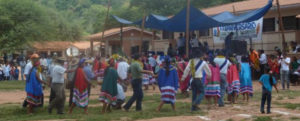
Originally Published at NACLA.org
The 2011 TIPNIS conflict exposed the contradiction between the MAS government’s proclaimed commitment to indigenous rights and the environment, and its aggressive pursuit of an extractivist development model. International media images of Evo Morales in indigenous garb were replaced by more familiar images of indigenous peoples mobilizing to defend their territories against the incursions of a capitalist state.
While the TIPNIS conflict is important, the attention given to this case has obscured a more complex set of relations between indigeneity, territory and extraction emerging in the Bolivian lowlands. In the gas-rich Chaco region, indigenous peoples are not simply opposing extraction. Rather, after two decades of hydrocarbon conflicts, they are rethinking their visions of territory and autonomy in the context of an extractivist development model. The results are proving deeply divisive, as strategic alliances with transnational companies are pitted against demands for inclusion in gas-funded state development projects.
These dynamics demonstrate the intimate but unstable relationship between hydrocarbons and citizenship in Bolivia under the Morales government. Alongside the government’s “neo-extractivist” development vision – where national gas rents are channelled into social programs and infrastructure projects – a range of sub-national territorial and political projects is emerging in relation to the governance of gas.
Understanding how indigenous peoples are responding to this new context requires an appreciation of the longer struggle for territory that has unfolded in the Bolivian lowlands over the past three decades. This has centered on Tierras Comunitarias de Origen (Native Community Lands, TCOs), collective indigenous territories recognized under the 1996 Ley del Servicio Nacional de Reforma Agraria (National Agrarian Reform Service Law, INRA), one of several multicultural reforms passed in this period.The legacies and frustrations of TCO land titling are playing an important role in shaping indigenous engagements with an extractivist development model.
